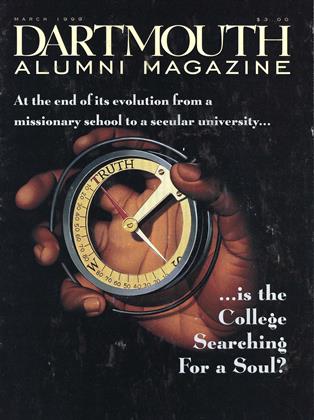All of us must ensure that no student feels alone.
LAST TERM several incidents (notably a lewd homecoming T-shirt and a Greek party with a "ghetto" theme) left many people feeling hurt and disaffected from the Dartmouth community. Several students, in the wake of these instances, took it upon themselves to organize a variety of events, including a forum and a rally. I spoke at both of these and emphasized the need for a more inclusive sense of community at Dartmouth.
After the rally and forum, I received a letter from an African-American student. She explained that so often when such incidents occur there is a sense among the minority community that they have to stand alone. She said that she appreciated the fact that I—and Susan—had both expressed our support. I wrote back to say that while I could not guarantee that such incidents would not happen again on our campus, I could promise her that she would not stand alone.
What does that mean, that she will not stand alone? On the occasion of the hundredth anniversary of Lincoln's Emancipation Proclamation, President John Sloan Dickey discussed why we as a nation had not made more progress in those hundred years. His answer was that it was "not so much that bad things were done, as that good things were not." At Dartmouth we all—students, faculty, alumni, and staff— have a responsibility to make good things happen, to shape the campus climate and to make sure that it is inclusive and supportive of the academic mission of the College. We cannot afford to let the culture here develop and evolve in ways that are counter to our central mission.
John Hope Franklin said at my inauguration: "Dartmouth can claim a longer history of conscious commitment to diversity than any other institution of higher education in the country." We have a proud history of openness and support for diversity. Dartmouth was one of the first colleges to admit Native American, African American, and international students. We played a founding role in the ABC (A Better Chance) program of the 19605, which attempted to rectify some of the national inequities in early education.
I intend to protect and enhance this legacy. I have urged New Hampshire legis- lators to recognize Martin Luther King Jr. Day as an official holiday, and I will seek other opportunities to speak out. I am reviewing ways we assign responsibility for diversity issues across the institution. I have made it clear to Dartmouth's senior officers that this issue is one of my top priorities.
Dartmouth students have historically played a crucial role in pushing the institution to be more diverse. It was students who insisted back in 1824 that the College admit Edward Mitchell, an African American. The Trustees had denied him admission because of concerns about how students would respond. When students discovered what had happened, they protested until the College opened its doors to Mitchell. Students in the 1950s worked to eradicate the exclusionary clauses in the fraternities. And in the 19605, students called for the College to offer more courses on African and African- American issues, admit more minority students, and hire more minority faculty and staff.
Faculty have a responsibility to ensure that the curriculum is inclusive and relevant to the world our students will encounter. Asian Studies, African and African-American Studies, Women's Studies, Native American Studies, and Latin American and Caribbean Studies help us in this endeavor. Relating courses to current issues has been an important part of the Dartmouth curriculum since the end of the first World War—from Ernest Martin Hopkins's course on citizenship to Dickey's Great Issues. National and international problems continue to have a curricular place. Matters of race and gender are no less timely, topical, or fundamentally important in our current curriculum.
Alumni, who are often the first contact with prospective students, play a crucial role in explaining what Dartmouth values. Alumni can be even more active in countering the image of Dartmouth as a place that is insensitive to students who do not fit certain stereotypes. I was delighted that at its December meeting the Alumni Council endorsed the College's "commitment to promoting diversity and affirmative action at Dartmouth and on a national stage."
We can never stop persons in our community from saying or doing things that prove hurtful. Individual freedom needs to be protected. But when such events take place, we share an obligation to make it clear that such incidents do not represent Dartmouth. And all of us need to step forward to make certain that no Dartmouth student stands alone.
 View Full Issue
View Full Issue
More From This Issue
-
 Cover Story
Cover StoryWhat Does Dartmouth Cry For?
March 1999 By Robert Sullivan '75 -
 Feature
FeatureMoney and Luck
March 1999 By Regina Barreca '79 -
 Feature
FeatureFirst person
March 1999 By Heather McCutchen '87 -
 Article
ArticleA Tale of Two Libraries
March 1999 By Noel Perrin -
 Article
ArticleExercising the Mind
March 1999 By Rich Barlow '81 -
 Sports
SportsSilver Honors for Ivy Women
March 1999 By Sarah Hood '98
James Wright
-
 Books
BooksFrontier Plans and Dreams
May 1980 By James Wright -
 Feature
FeatureWAR AND REMEMBRANCE
December 1995 By James Wright -
 Feature
FeatureDartmouth's Balance
MAY 1997 By James Wright -
 Article
ArticleThe Best of Both Worlds
DECEMBER 1998 By James Wright -
 Article
Article"Quite a Group"
Sept/Oct 2005 By JAMES WRIGHT -
 notebook
notebookGood Neighbor
NOVEMBER | DECEMBER 2020 By JAMES WRIGHT
Article
-
 Article
ArticleCOLLEGE NOTES
October, 1908 -
 Article
ArticleDARTMOUTH SHUT OUT
June, 1909 -
 Article
ArticleMRS. MORSE WILLS DARTMOUTH $25,000
August 1924 -
 Article
ArticleFinal Registration
November 1934 -
 Article
ArticleTHE UNDERGRADUATE CHAIR
DECEMBER 1964 By BOB WILDAU '65 -
 Article
ArticleSilence, Identity, and Apes
DECEMBER 1996 By Professor Lindsay Whaley


